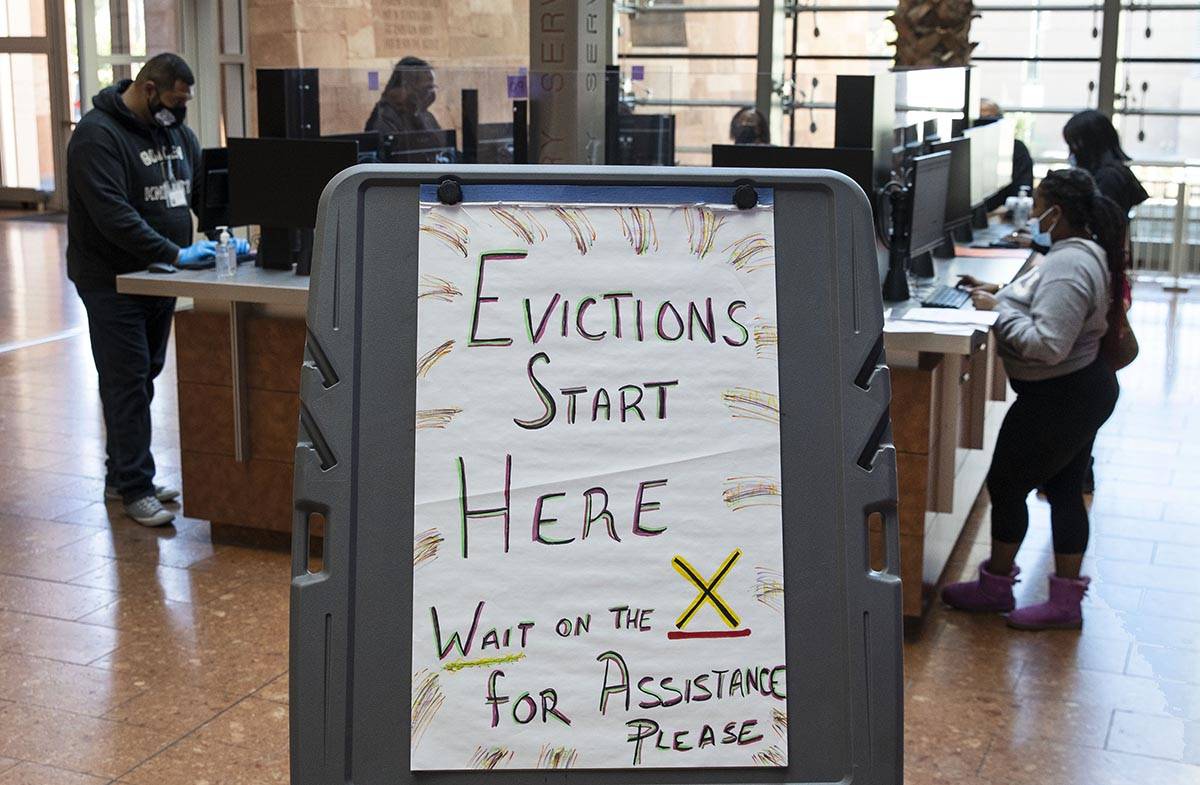Nevada’s eviction ban ends, CDC moratorium still in effect
The holiday weekend finished on a low note for many Nevadans who have been unable to pay rent since last year.
The state’s eviction moratorium ended Monday, allowing landlords to serve eviction notices for nonpayment of rent.
Gov. Steve Sisolak had reinstated the moratorium in December to protect renters who lost a job or had their work hours cut as a result of the coronavirus pandemic — a protection that pitted many landlords and property managers against state policymakers and housing advocates.
Experts say a flood of lockouts in June is highly unlikely because the federal eviction moratorium is still in effect until June 30, despite being overturned by Trump-appointed U.S. District Court Judge Dabney Friedrich for the District of Columbia this month.
Jim Berchtold, Legal Aid Center’s directing attorney of the Consumer Rights Project, said a temporary stay is in place, meaning there’s no immediate impact on the ban, as the Department of Justice filed an appeal.
“Realistically, nothing is going to happen in a month so my guess is by the time the courts actually get to that case it’s going to be moot because the (CDC) order will have expired,” Berchtold said.
It’s a sentiment shared by Nevada State Apartment Association Executive Director Susy Vasquez. She told the Review-Journal this month that it’s not a moment of relief for Nevada’s landlords, as the case could take months to be resolved and President Joe Biden could also sign an executive order extending the ban.
“We’re kind of in the waiting game to see how it’s going to move forward or if it’s going to move forward (in court),” she said.
Next steps
Under the state moratorium, landlords were prevented from serving eviction notices to tenants for nonpayment of rent due to the pandemic as long as the tenant provided a signed declaration form saying they met the eligibility requirements.
A landlord was only able to file an eviction notice if the tenant had violated other terms of the rental agreement such as engaging in criminal activity or creating a nuisance.
Under the CDC moratorium, landlords can serve an eviction notice and the process could move through the state’s justice courts.
“The way the court has interpreted the CDC order is that the process can go forward but the lockout is prevented,” Berchtold said. “So that makes it doubly important that a tenant absolutely files a response to that eviction notice because otherwise the landlord could get an eviction by default.”
Berchtold said the Legal Aid Center has been advising renters worried about receiving an eviction notice after Monday to take the following steps:
Apply for rental assistance through the county’s CARES Housing Assistance Program. If a renter has already applied for rental assistance it’s important to make sure account information has been updated and the necessary documentation has been submitted.
Sign a CDC declaration form, which is different than the state’s declaration form, and submit it to the landlord. Renters must opt-in to be protected under the federal moratorium by signing then submitting the form to their landlord. The form can be found on the CDC’s website.
Should a tenant receive a 7-day notice to pay rent or quit from their landlord the tenant must file an answer with the Justice Court. Las Vegas residents can file their response electronically. Tenants are also encouraged to request free mediation, an option found on the Tenant Answer form. It’s also important to still appear for any court hearings or mediation dates.
If tenants have questions, Berchtold encouraged Nevadans to visit the Civil Law Self-Help Center, located in the lobby of the Regional Justice Center in downtown Las Vegas, or visit the center’s website at civillawselfhelpcenter.org. Tenants can also contact Legal Aid Center at 702-386-1070.
He said Legal Aid is currently working on outreach programs as it anticipates a flood of tenants requesting assistance with their eviction notices. It is also planning to open the Civil Law Self-Help Center on Fridays — the office operates Monday to Thursday.
For example, Legal Aid Center announced last week it would be partnering with the Las Vegas-Clark County Library District to provide free eviction-related legal help at various library branches. Tenants will be able to visit the pop-up clinics and meet with Legal Aid lawyers and volunteers, who will provide assistance with online forms and e-filing.
The service is available on a first-come, first-serve basis and tenants are encouraged to bring their eviction notice.
Pop-up events are scheduled from 10 a.m. to 6 p.m. on June 5 at both Whitney, 5175 E. Tropicana Ave., and Clark County, 1401 E. Flamingo Road. The next event takes place June 12 at West Las Vegas, 951 W. Lake Mead Blvd, and again at Clark County.
Federal protection
The CDC eviction moratorium was announced under the Trump administration last year and took effect Sept. 4 — a measure aimed at lowering the spread of COVID-19 as residents were asked to shelter in place. Tenants are still required to back pay missed rental payments and landlords are able to charge or collect fees, penalties or interest.
The CDC enacted the moratorium under the Public Health Service Act of 1944 that allows the federal government to impose measures such as quarantines during public health emergencies.
Friedrich overturned the ruling this month, saying the CDC had exceeded its authority by implementing the ban.
A number of landlords have challenged the CDC order in lower courts, but that has led to conflicting rulings with judges applying it to the parties involved. However, Friedrich’s ruling applies nationwide, writing that the federal government’s request to limit her ruling to the parties in the case is a position “…‘at odds with settled precedent.’”
The Department of Justice appealed the decision on behalf of the CDC and the ruling was stayed by Friedrich until the appeal is decided.
The CDC moratorium was expected to end Dec. 31 but received a series of extensions with the latest expiration date set for June 30.
Contact Subrina Hudson at shudson@reviewjournal.com or 702-383-0340. Follow @SubrinaH on Twitter.











































